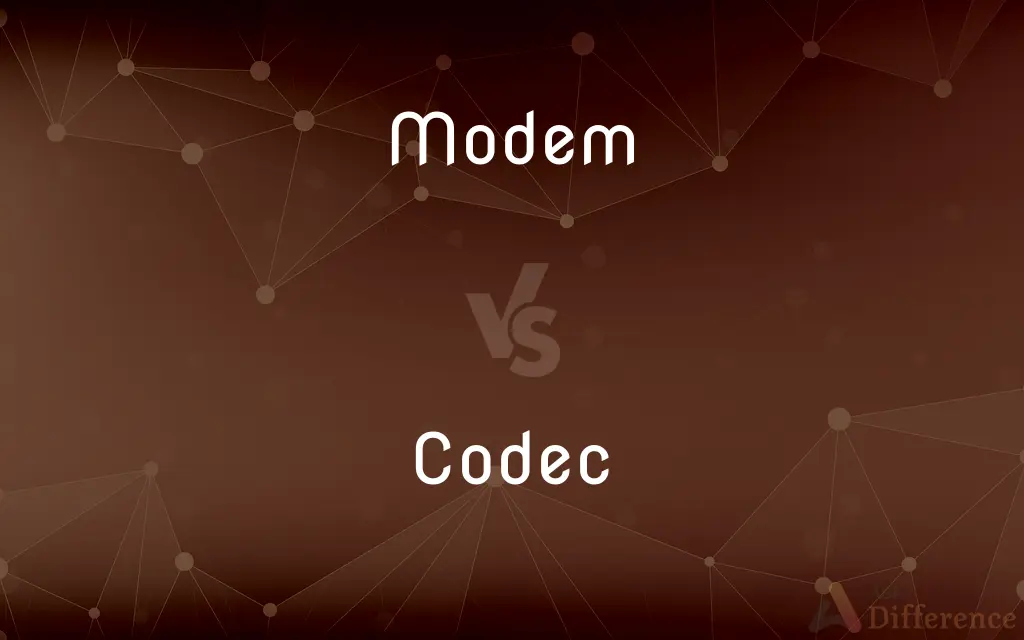Modem vs. Codec — What's the Difference?
By Urooj Arif & Maham Liaqat — Updated on March 9, 2024
A modem modulates and demodulates signals for data transmission over telephone lines or cable, facilitating internet connectivity, while codec encodes and decodes digital data streams, such as audio or video, optimizing them for playback or transmission.

Difference Between Modem and Codec
Table of Contents
ADVERTISEMENT
Key Differences
Modems are devices or system software that convert digital data from a computer into analog signals for transmission over communication lines, such as telephone lines or cable networks, and then back into digital form at the receiver's end. This process, known as modulation and demodulation, is essential for connecting to the internet. On the other hand, codecs are algorithms or hardware that compress and decompress digital media files, such as audio or video, making it possible to reduce the file size for transmission or storage without significantly compromising quality. While codecs deal with the encoding and decoding of digital content, modems are concerned with the actual transmission of data over physical networks.
Modems play a crucial role in establishing and maintaining internet connectivity, acting as the gateway between a user's local network and the wider internet. They ensure that data can be transmitted efficiently over long distances. Conversely, codecs focus on the efficient encoding and decoding of digital content. They are vital for multimedia applications, enabling streaming, video conferencing, and broadcasting by compressing data to manageable sizes that can be easily transmitted and then decompressing it for playback.
The functionality of modems is largely independent of the content being transmitted. They are concerned with the conversion and transmission of data packets, regardless of whether the data is audio, video, or any other form. In contrast, codecs are highly dependent on the type of data they are designed to handle, with specific codecs optimized for audio (like MP3, AAC) and others for video (like H.264, HEVC).
In terms of application, modems are a more universal component of network infrastructure, required for any form of digital communication over traditional phone lines, cable systems, or even satellite communications. Codecs, however, are more specialized tools that play a critical role in multimedia applications, where they enable the efficient processing, transmission, and playback of high-fidelity audio and video content.
While both modems and codecs are essential for the transmission and reception of digital data, their roles are complementary rather than overlapping. Modems facilitate the connection and data transmission across networks, while codecs ensure that the content being transmitted is in an optimally compressed format, balancing quality and bandwidth usage.
ADVERTISEMENT
Comparison Chart
Primary Function
Converts digital data to analog signals and vice versa for transmission.
Compresses and decompresses digital audio or video data.
Usage
Facilitates internet connectivity.
Optimizes digital media for transmission or storage.
Process
Modulation and demodulation.
Encoding and decoding.
Data Type
Transmits any digital data.
Focuses on audio or video content.
Application
Essential for connecting to the internet across various communication lines.
Critical for multimedia applications like streaming and video conferencing.
Compare with Definitions
Modem
A device that modulates and demodulates signals for data transmission.
The modem connects your home network to the internet via your service provider.
Codec
Specific to audio or video content.
The H.264 codec is popular for video compression.
Modem
Converts digital data from a computer to analog signals and back.
The modem ensured our data was transmitted efficiently over the phone line.
Codec
Software or device that encodes and decodes digital media.
The video codec compressed the movie to a size suitable for streaming.
Modem
Universal in digital communication infrastructure.
Every household with internet service has a modem.
Codec
Balances quality and bandwidth usage.
Modern codecs efficiently compress high-definition video for online streaming.
Modem
Independent of data content type.
Whether it's video or text, the modem transmits all data types.
Codec
Critical in multimedia applications.
Codecs are essential for video conferencing software to work smoothly.
Modem
Facilitates communication over telephone lines or cable.
A cable modem uses the coaxial cable for your internet connection.
Codec
Optimizes media for transmission or storage.
Audio codecs like MP3 reduce file size without much loss in quality.
Modem
A modulator-demodulator, or simply a modem, is a hardware device that converts data from a digital format, intended for communication directly between devices with specialized wiring, into one suitable for a transmission medium such as telephone lines or radio. A modem modulates one or more carrier wave signals to encode digital information for transmission, and demodulates signals to decode the transmitted information.
Codec
A codec is a device or computer program which encodes or decodes a data stream or signal. Codec is a portmanteau of coder/decoder.In electronic communications, an endec is a device which acts as both an encoder and a decoder on a signal or data stream, and hence is a type of codec.
Modem
A device that transmits and receives data using a modulated carrier wave. Modems are used to establish network and internet connections.
Codec
(computing) A device or program capable of performing transformations on a data stream or signal.
Audio and video codecs are important in making multimedia files small enough to distribute and simple to play back.
Modem
A device that encodes digital computer signals into analog/analogue telephone signals and vice versa and allows computers to communicate over a phone line.
Modem
To transmit by modem.
Modem
An electronic device that converts electronic signals into sound waves, and sound waves into electronic signals, used to transmit information between computers by the use of ordinary telephone lines; also called modulator-demodulator; as, the latest modems can transmit data at 56,000 baud over a clear telephone line. The speed of transmission of information by a modem is usually measured in units of baud, equivalent to bits per second.
Modem
(from a combination of MOdulate and DEModulate) electronic equipment consisting of a device used to connect computers by a telephone line
Common Curiosities
Can modems and codecs work together?
Yes, they often work together, especially in online streaming and video conferencing, where modems handle data transmission and codecs manage media compression.
What determines the choice of codec for a specific application?
Factors include the type of media (audio or video), desired quality, bandwidth limitations, and compatibility with playback devices.
Why are codecs important for digital media?
Codecs reduce the size of digital media files without significantly compromising quality, making it easier to store and transmit them efficiently.
Are modems still necessary with high-speed internet?
Yes, regardless of speed, modems are necessary to connect a local network to the internet through various types of communication lines.
How do modems affect internet speed?
The capabilities of a modem can limit the maximum internet speed accessible to a user, depending on its technology and the type of communication line used.
Do codecs affect the quality of digital media?
Yes, the efficiency of a codec in compressing and decompressing data can impact the quality of the resulting audio or video, balancing file size with quality.
Is it possible to upgrade modems and codecs for better performance?
Yes, upgrading to a newer modem can improve internet connectivity and speed, while using updated codecs can enhance media compression efficiency and quality.
What is the primary function of a modem compared to a codec?
A modem facilitates internet connectivity by converting digital data to analog signals and vice versa, while a codec compresses and decompresses digital media like audio and video.
How do modems and codecs differ in their application?
Modems are used for internet connectivity across various communication lines, while codecs are used in multimedia applications to optimize digital media for transmission or storage.
Can a device function as both a modem and a codec?
While a single device can include both functionalities, especially in complex systems like smartphones or computers, their primary functions remain distinct.
How do advancements in technology impact modems and codecs?
Technological advancements lead to faster and more efficient modems, as well as codecs that offer better compression ratios and quality.
Why might a business choose a hardwired modem connection over wireless?
For reliability and security, as hardwired connections typically offer more stable and secure internet access compared to wireless.
How has the evolution of modems impacted internet usage?
The evolution of modems, from dial-up to fiber-optic technology, has greatly increased internet speed and reliability, enabling more complex online applications.
Can the efficiency of a codec reduce the need for bandwidth?
Yes, more efficient codecs compress data more effectively, reducing the bandwidth needed for transmitting high-quality digital media.
Share Your Discovery

Previous Comparison
Percher vs. Soul
Next Comparison
Court vs. FieldAuthor Spotlight
Written by
Urooj ArifUrooj is a skilled content writer at Ask Difference, known for her exceptional ability to simplify complex topics into engaging and informative content. With a passion for research and a flair for clear, concise writing, she consistently delivers articles that resonate with our diverse audience.
Co-written by
Maham Liaqat















































